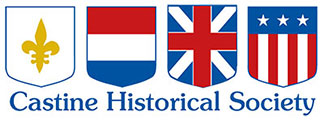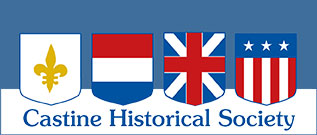Exciting New Exhibit Debuts on Castine’s Hidden History of Ships and Shipping
May 6th, 2019
In early June, the Castine Historical Society will debut its newest seasonal exhibition, Risky Business: Square-Rigged Ships and Salted Fish. Visitors to the exhibition may arrive with notions of a romantic seafaring life, but they will instead discover the major risks and hardships associated with Castine’s global 19 th -century maritime trade.
The exhibit is open free of charge to the public daily from June 10 – September 2. Following Labor Day, the exhibit is open from Friday – Monday through October 14. For people who cannot visit during these times, the exhibit will reopen in early June 2020 for one more season. For detailed exhibit hours and to learn about the series of related lectures and exhibit talks visit www.castinehistoricalsociety.org.
 Thanks to generous sponsorship funds from the Majabigwaduce Chapter of the National Society
Thanks to generous sponsorship funds from the Majabigwaduce Chapter of the National Society
Daughters of the American Revolution in Brooksville, Maine; the Maine Humanities Council;
and Thomas Adams and Nancy Marto, artifacts from museums, private collections, and the
Historical Society will be featured. On display will be stunning portraits and ship paintings,
compelling first-hand accounts, detailed ship’s logbooks and shipping documents, navigational
charts, poignant letters to and from home, and objects.
Risky Business: Square-Rigged Ships and Salted Fish reveals that severe weather, slow communications, navigational hazards, competition for cargo and crew, illness, war, politics, and even pirates were all too real in the so-called glory days of sail. Castine’s captains, seamen, merchants, and their families accepted the risks of the commercial sailing business as they carried fish, cotton, and salt to and from distant ports in Castine-built square-rigged ships. Guest curator Richard M. Ames has spent five years of in-depth research in libraries and archives, including his own family’s archives, documenting Castine’s maritime trade. He says, “When embarking on this research odyssey, I never expected to uncover so many firsthand accounts related to Castine-built trading ships and the hardships endured on their voyages. Visitors will come away from this exciting exhibit with a new appreciation for the stalwart souls and sturdy ships that empowered Castine’s golden era of sail.”
The Castine Historical Society will publish and sell Ames’ fully-illustrated book offering a fresh interpretation of Castine’s booming nineteenth century maritime economy. Copies of the book will be available for purchase in the Castine Historical Society’s gift shop or online at castinehistoricalsociety.org.
The Castine Historical Society opens a window into Castine’s extraordinary past through preserving local history and hosting changing exhibitions, lectures, town walking tours, house and garden tours, and historic reenactments. The Historical Society’s Abbott School features the exhibit gallery, gift shop, and a community meeting space at 17 School Street, Castine. The Grindle House offices and research library at 13 School Street are open year-round and researchers are welcome by appointment. For exhibit hours and further information visit
www.castinehistoricalsociety.org or call 207-326-4118.

